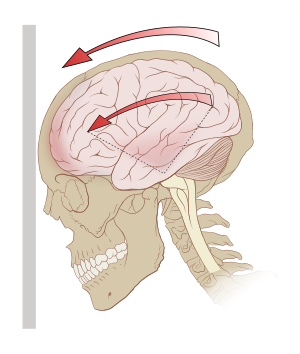Concussion, Shmucussion.
by Holland-Mark | December 21, 2009

- Image via Wikipedia
Watching Monday Night Football last week, an ad co-sponsored by the NFL and the CDC aired that surprised me. It was targeted towards football players, families, and coaches, asking them to properly address potential concussions. This year, the NFL also decided to tighten restrictions for players returning to games after head injuries. Previous to this, a player had to lose consciousness before being removed from the game — now, critical signs of concussions, such as memory loss, dizziness, or headaches are reason enough.
I guess what surprised me was that the NFL has to ask third parties to intervene between players and their health. Given that a football player’s career depends on their ability to, oh, stay alive, for example, I’d imagine that they would take a concussion very seriously. However, Hines Ward of the Pittsburgh Steelers cleared up any confusion I had with his statements after their loss to Baltimore, where QB Roethlisbeger did not play due to signs of a concussion: “This game is almost like a playoff game. It’s almost a must-win. I could see some players or teammates questioning, like, ‘It’s just a concussion. I’ve played with a concussion before.'” Ward has since backed off his comments, but it doesn’t take much of a cynic to question what happens behind the locker room doors — and Roethlisberger was on the field the next week.
Changing organizational behavior is always a difficult task, and one of the biggest mistakes an organization can make is to dictate major changes from the top down. Unless those impacted recognize the benefit of change (or in this case, the detriment of non-change), the cultural forces will actually act as a counterweight. While the NFL’s new rules or their attempt to appeal to families to get involved are important, it doesn’t address the emotional impact of a player feeling like he let down the team — or the team members who think that a concussion is code for weak. With those forces, it’s no wonder that 1 in 5 NFL players have hid the effects of concussions. I wonder if the NFL has done an exhaustive job of building understanding and internal momentum with players to respect concussions as “real” injuries. After all, no player expects a running back to go out there with a broken leg. And because the real impact of a concussion comes long after the initial hit, maybe they need real examples of ex-NFL players suffering from the effects.
Unfortunately, it looks like the Steelers may be out of the running for the playoffs, though it’s unlikely that the Baltimore loss was the deciding factor. In the meantime, I hope the NFL can think of a way to truly affect organizational change. Any ideas?
Related articles by Zemanta
- ‘Monday Night Football’ analyst Jon Gruden agrees to multiyear contract extension with ESPN (sports.espn.go.com)
- Roethlisberger hurting, Steelers lose Batch too (cbssports.com)
- Finally! Pro Sports take a look at concussion dangers (unaskedadvice.wordpress.com)
- Throw a Yellow Flag on Football-related Head Injuries, Warns the Harvard Mental Health Letter (prweb.com)
- NFL to ask players to donate brains for study (nationalpost.com)
- Cardinals apply vicious head slap to Seahawks’ hopes (seattlepi.com)

![Reblog this post [with Zemanta]](http://img.zemanta.com/reblog_e.png?x-id=3bd23072-454b-4dc9-9572-00735e6735f8)